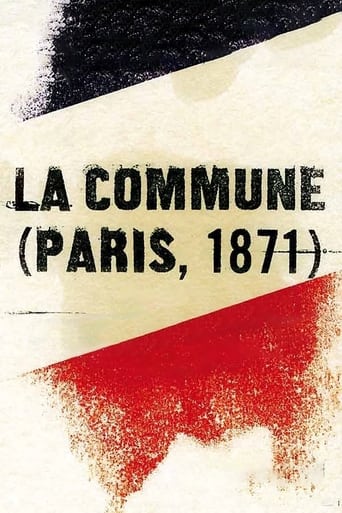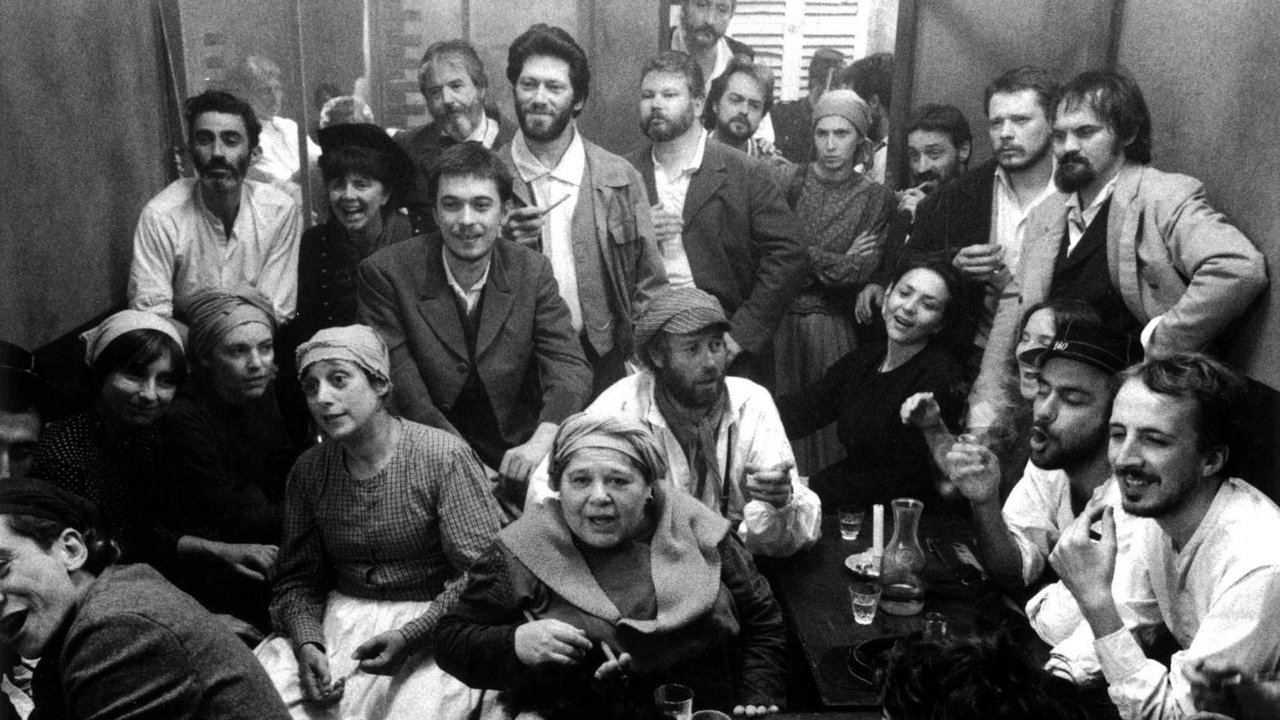DrMMGilchrist
****Spoilers only if you don't know 19C history.**** I saw this DVD advertised online, and bought in the shops in France this summer. It was worth the search. At over 5 and a half hours, it is of epic length, but the intimacy of the drama and the exhilaration of its debates make it an inspiring and involving experience. Simultaneously uplifting and heart-breaking, it brings to life one of the greatest stories of 19C which (thankfully) Hollywood has never touched: the 10 weeks of the Paris Commune which ended in the 'Semaine Sanglante', in which 20-30,000 Parisians were slaughtered by Thiers' Versailles government.Peter Watkins is one of British TV's 'originals', famous in the 1960s for his time-bending approach to historical subjects such as 'Culloden', with modern-day reporters interviewing the characters in the field. Controversy over 'The War Game' led to a permanent rift with the BBC and over 30 years working abroad. 'La Commune: Paris 1871' harks back to the dramatised-documentary style of 'Culloden', but is more sophisticated in form and more appealing in subject ('Culloden' was more about Vietnam than 18C Scotland). It engages with contemporary debates on global capitalism, the media, and social activism versus consumerist passivity. It's a true ensemble-piece: the actors, mostly non-professionals (including present-day 'misérables': the unemployed and asylum-seekers), combine scripted work with improvisation: the debates are real. We are led into the story by our main narrators, who address us as themselves - Gérard Watkins and Aurèlia Petit - then in character as Communard reporters Gérard Bourlet and Blanche Capellier. Peter Watkins uses the deliberately anachronistic device of having TV stations from both sides - the Commune and Versailles - covering the events, with their reporters interviewing participants in the conflict. Helped by a journalist from the satirical magazine 'Père Duchêne', Joachim Rivière (Joachim Gatti), Blanche and Gérard guide us around the 11th Arrondissement. The Versailles station, National TV, relies on interviews with pundits (including Bonapartist historian François Foucart as himself), and an attempt at undercover reporting which endangers their hapless young journalist when the crowd rumbles his disguise and thinks he's a spy! Most of the characters are not great names of history, but ordinary citizens of Rue Popincourt, pupils of a convent-school in Rue Oberkampf, artisans, National Guard, a pawnbroker, bourgeois, clergy, soldiers, and Algerians bearing news of colonial suppression in their homeland. Unlike many historical films, 'La Commune' emphasises women's aspirations *without* anachronism, given the real-life importance of the Women's Union, Louise Michel and Elizaveta Dmitr'eva, & c. We meet Françoise Boidard (Armelle Hounkanrin) and Marie-Louise Beauger (Véronique Couzon), two young teachers who want to give girls a proper education, not the needlework, prayers and passive obedience taught by the nuns. The seamstresses, washerwomen and gunsmiths want greater control over their working lives, so form co-operatives. At the town hall, the Women's Union struggles to secure a meeting-room: many of the male Communards still have a lot to learn about female emancipation! The local Women's Union organiser is a dynamic character, vividly realised. Of the actors in identified historical rôles, Catherine Humbert is excellent as Marguerite Lachaise, the 66th Battalion's jauntily uniformed cantinière, as are the men playing Augustin Verdure and the sculptor/subcommittee delegate Charles Capellaro (rather more dashing than his historical original!). But we also see dangerous problems within the Commune: the tensions between centralisation and grass-roots democracy, authoritarianism and egalitarianism, Jacobinism and socialism. The spectre of the Committee of Public Safety is resurrected. Some Communards turn on the reporters for daring to be critical; press censorship is re-introduced, despite protests. As in Spain in the 1930s, a noble cause, under external threat, stumbles over internal disputes. The government's massacres are answered by the Commune's execution of hostages, including the Archbishop of Paris. But the Versailles response is hideously disproportionate: 'total expiation', including killing the wounded in hospital. As the army slaughters its way through the city, the government of the Commune retreats to the Mairie of the 11th Arrondissement. The people we know are now on the front line, from Françoise and Marie-Louise's little schoolgirls to the aged Jules Thibaudier. Thanks to the long running-time, and lengthy on-screen discussions, we have learned to care for them through sharing their struggles for empowerment. To see them risking death on the barricades or by firing squad is heart-breaking. Aesthetically, the film succeeds by understatement. The warehouse-bound set conjures a claustrophobic atmosphere of narrow streets, of siege and barricade. The stark black and white photography is reminiscent of 19C photographs: freeze-frame some of the characters, and you could be looking at cartes-de-visite of the era. Although groups of characters sing to raise morale or celebrate: 'La Marseillaise', 'La Carmagnole', 'Le Chant des Ouvriers', and a ferocious war-chant of 'Ça ira', there is no constant musical soundtrack to manipulate the emotions à la Hollywood. The simple staging and shooting, the use of monochrome and the lack of gruesome special effects are the antithesis of modern blockbusters, yet the climax of 'La Commune' - true and tragic - is a more powerful and moving piece of epic heroism than the Battle of Helm's Deep in 'The Two Towers' (I say this as a fan of Jackson's Tolkien trilogy). I also recommend this film to admirers of Hugo's unabridged novel 'Les Misérables': the next generation's story?Stepping out of character, the actors relate the issues of the Commune to contemporary society: "Fight with us for Utopias: there are still some left to defend!" "...Today it's up to each person to be his/her own barricade!" When Jean-Baptiste Clément's 'Le Temps des Cerises' begins over the credits, I found myself singing along, despite lump-in-the-throat. In this cynical age, the vibrant optimism and courage of 1871 are vital: it's heartening to know that many of the participants have formed 'Le Rebond pour la Commune', to aid in the film's distribution and to carry forward its vision.
thaddeus_welles
Truly exceptional film making really breaking down the barriers of what is storytelling and letting everything run free. Peter Watkins does what would seem the impossible, not only create a realistic re-enactment of the commune in Paris (just after the siege of the Prussians and the exile of the bourgeois to Versailles) using only an abandoned warehouse and 200 odd unemployed French citizens and illegal immigrants but also to on top of that add a detailed and amazing social experiment. Putting these people through this experience and then have them portray not only their 1871 characters but also themselves in the one film. To hear these people talk about life today and draw parallels between the film they are making and the lives they lead is quite invaluable information. And as if that alone wasn't enough there is the whole other element of the media and how sides are formed and why people believe what they do and how things are taught and passed down so that divides never seem to cease. The use of reporting and television and newspapers really give this film a whole other level from which to operate and constantly throughout the film one has to ask themselves "who do I believe, do I believe anyone" "why am i believing what this person says and not this person" then as if one hasn't had enough thinking to do already you then, like the cast, have to project forward to today and ask yourself who do i believe when it comes to the reporting of current events? Am I receiving an accurate picture of what is occurring? I don't think anyone who offers themselves up to this 6 hour masterpiece can look at the media in quite the same way. Once again I just have to say this film is without a doubt set to become a masterpiece to filmmaking and I urge anyone who happens to see it on a program for a festival or perhaps even on television to sacrifice those few hours, you wont be disappointed. Also is you are left in awe after its viewing as I was then look out for the Universal Clock- The Resistance of Peter Watkins, it acts as a sort of "making of" but is a film in its own right and gives insight to what it was like to be involved in the making of Le Commune Paris 1871
nbott
Once again, the National Gallery of Art film program has brought us another film we are unlikely to see at any other theater. This is an uneven but ultimately fascinating look at a relatively unknown period in French history, the 1871 Communard revolution in Paris right after the Franco-Prussian War. The filmmaker uses non-professional actors who were also allowed to be co-producers and to write their own lines to some extent. It is shot in black and white and on Beta Digital tape. The film technique reminds me of an old TV program from the 1950s' called "You Are There" in which today's media looks back on history and even interviews the participants in the historical drama.The film is very slow going which gives the viewer a total feeling of both being there right in the action on a day to day basis while looking down on it from afar. We live the everyday life of the people in Paris during this short period of 2 1/2 months. At some points, the actors stop the action and comment on their involvement in the making of the very film they are in. Also, they and the filmmaker comment on globalization and peoples' rights in today's world. History is brought forth into our present time and we see that all events in human history are more alike than they are different.
This film is not for the average movie-goer. It is for a small audience of patient students of history and politics. It fascinated me but also tried that patience quite often. I would recommend not attempting to view this film without being well rested. It is in two parts of three hours each. Frankly, the filmmaker could have cut this down and still had a powerful history lesson for all of us.
claytonlowe
Peter Watkins' nearly 6-hour long docudrama, "La Commune (Paris, 1871)," is a surprisingly passionate and fast-moving lesson in history. It is also a brilliant demonstration of how history is shaped, and re-shaped, by the tellers of the tale.Using the "You Are There" approach of earlier radio and TV days, Watkins has a male and female news team from "Commune TV" wandering through the poorest district of Paris inviting people to express their grievances against the state to the camera.While the people bitterly suffer because of the government's inept defeat at the hands of the Germans during the Franco-Prussian War, their anger inspires solidarity for them throughout Paris, and although they briefly rise up and seize power, they are brutally put down in the end.Ironically, during the course of their uprising, a TV monitor in the background features happy-talk "Versailles TV" news anchors, who continually vilify the Communards and rationalize the government's brutal acts of supression."La Commune" is a must-see for students of history, and a must-see for students of the media.


 AD
AD





